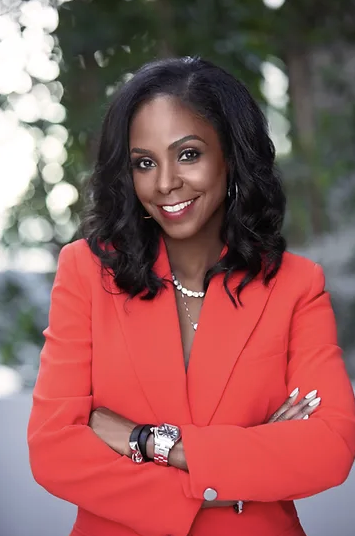
Get to know BET’s Executive Vice President and Chief Marketing Officer Kimberly Evans Paige
It’s not every day you meet a real-life superhero. If you ask Kim Paige, Executive Vice President (EVP) and Chief Marketing Officer (CMO) at Black

Let’s face it. When it comes to talking about investing in the stock market, women tend to tune out. This could be because “investing” and “stock market” scream male-dominated.
But, using the stock market as a tool to generate long term wealth is something everyone should consider….and yes, that includes you. Wendy Cartagena is the founder of “Invested Millennial” an online community dedicated to educating and empowering women (especially women of color) to invest in the stock market.
We understand that getting started in the stock market can be tough – which is why we caught up with Wendy to answer the basic investment questions and debunk some of the most common investing myths.
1. As a recent college grad, why should I be trying to invest in the stock market?
W: When it comes to personal finance, investing should be one of the top things on your list. Investing is a way to grow your money over time with a hands-off approach.
As a college grad, investing allows you to start building healthy money habits early because you’re learning how to budget and capitalize on your income. Over time, you’ll be so happy that you made the choice to invest because of the way your money grows with the snowball effect.
2. Do I still need to invest if I’m already saving?
W: Yes! If you’re trying to figure out whether you should save or invest, consider doing both. While saving allows you to have instant cash, it’s not growing at the rate your money would if you invested it in the market.
Additionally, if you’re only saving, you have to beware of the power of inflation. By the time you reach your target savings goal, things could be more expensive. If you invest, your money grows and can keep up with inflation.
3. Isn’t it super risky to invest in the stock market?
W: I had this same fear before I started investing. The stock market is “risky” because it’s volatile. It’s driven by market news, other economies around the world, and us (the investors). But, you don’t necessarily lose money because the market is volatile.
People can lose money in the market because they don’t strategize on what industry or sectors will make sense to hold long term. They follow trends and once they don’t like the stock anymore, they pull their money out.
It’s best to invest long term. During the economic downturn due to COVID-19, I took the opportunity to buy quality companies that have been in that market for many years. They probably aren’t the most popular stocks, but I know my money will be secure long term.
4. I don’t make enough to invest my income. Should I wait to start investing?
W: Do not wait. No matter how much you make, there’s still room to invest. Many investing platforms now have a $0 minimum meaning you can invest whatever you can afford.
Before, it was much harder for younger people to invest because most platforms had $500 – $1,000 minimums. You couldn’t open an account unless you had that money upfront. Now this entire industry is accessible to us. Whatever you have remaining at the end of the month once all expenses are paid…invest it.
5. Okay, I want to invest but, where do I start?
W: I always tell my girlfriends that the best way to get started is with your retirement account. That’s the easiest way to understand the market. Once you get comfortable with your retirement account, then you can switch over to a regular brokerage account.
If your job offers a 401K, take advantage of it. But, I also recommend people get a Roth IRA as well. That’s a retirement account where you can invest money that has already been taxed from your paycheck. You can invest just as you would in the everyday stock market.
With a Roth IRA, you can’t touch that money until you retire. But, the beauty of it is that when you retire, that money will not be taxed. Even if you are in a high tax bracket, you still won’t owe the IRS any money. With a 401k, when you retire, that money will be taxed and you will be taxed based on your income tax bracket.
6. What’s the right age to start investing?
W: The earlier you can start investing the better. I would say 18 as the targ et age because most 18-year-olds have jobs. Starting early builds good money habits. Once you’re older, you will continue to have those good habits that will keep you on track to achieve your financial goals.
Starting young in the market also allows you to gradually understand how the market works. There’s no pressure to understand it all at one time because you’re only investing a small amount of money. So by the time you’re 23, you’re almost an expert in the market because you’ve been investing for 5 years.
7. Why is it important for more women to start investing?
W: The world of finance is an industry dominated by white males. There’s not a lot of women in leadership positions that represent women or women of color.
Because of that lack of representation, women typically don’t have an interest in understanding how it all works. We shy away from understanding how the market can help us build long term wealth because we don’t see it as something that we should be partaking in.
We need more women to get involved because finance is not just a boys club. When there are women in the finance industry, they can serve as that representation to encourage other women to start getting involved.
8. What resources should I use to learn more about the market?
9. What’s one piece of advice you’d give yourself when you first started investing?
W: Stay consistent in the beginning.
When I got my full-time offer at my job, I struggled between wanting to spend my money and investing. I knew I had set financial goals, but there was also a part of me that wanted to enjoy my 20s and do the things that made me happy.
It took me about two years to settle down and start putting money away consistently. Knowing the bigger picture and understanding why it’s important to invest is good to understand early on your journey.
More About Wendy:
Wendy is currently a tech business analyst. She originally created the Invested Millennial community on Instagram and YouTube to document her investing journey. However, Wendy realized there was nothing more empowering than sharing knowledge and encouragement to help other women (especially minority women) learn the importance of investing.
She then switched her approach from sharing her personal investing picks to doing research for her community. She now creates bite-sized posts that spark interest in investing and ways to use the market to build long term wealth. Wendy’s goal is to provide peer-to-peer support and strengthen women’s comradery on social media to continue to strive toward closing the gender investing gap. If you have any investing questions, contact Wendy @helloinvestedmillennial.com

Get to know BET’s Executive Vice President and Chief Marketing Officer Kimberly Evans Paige
It’s not every day you meet a real-life superhero. If you ask Kim Paige, Executive Vice President (EVP) and Chief Marketing Officer (CMO) at Black

I got my big girl job in 2019. While I was so excited to make a salary, I remember being laser focused on making sure

Let’s be real – navigating the 20-something years can be tricky. Today I’m chatting with Carron Brown, the Vice President of Creative Brand Experience at
Keep up with us for bite-sized tips on how to LEVEL UP in your career
©2023 The Colors of Her Success. All Rights Reserved. Website by HD Digital Design.